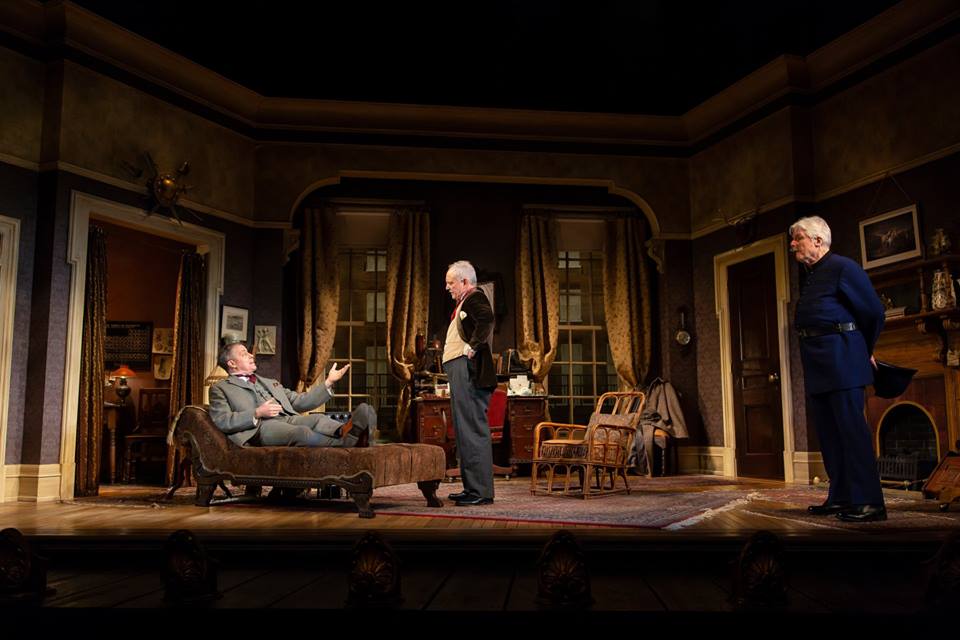
Rufus Collins, Mark Zeisler, and Malcolm Ingram in SHERLOCK’S LAST CASE. Photo: T. Charles Erickson
Presented by Huntington Theatre Company
Scenic Design by Hugh Landwehr
Written by Charles Marowitz
Directed by Maria Aitken
September 28 thru October 28, 2018
Huntington Avenue Theatre
264 Huntington Ave, Boston, MA 02115
On Facebook and Instagram
Written by Bishop C. Knight
(Avenue of the Arts, Boston) What I appreciate about the Sherlock and Watson mysteries are the stories’ focus relationships. Sherlock and Watson’s cases are often initiated by a client who needs help with a relative and, at least once before the mystery is solved, Sherlock or Watson expresses loving gratitude for the delightfully dotty Mrs. Hudson. My favorite character is Dr John Hamish Watson, whom I adore for the same reasons I adore Tom Hagen in The Godfather saga. Dr Watson is an intelligent, reliable, and logical gentleman with an understated wit. He is quiet, loyal, short and handsome. I might have a crush on Doctor Watson…
So you know my preference, my blinding bias, my posh fever of polite puppy lurve. It’s a fondness for Dr John Hamish Watson, Sherlock’s duteous and dear friend for most of the play … answering the door when Sherlock won’t respond to the bell, bringing the mail in the house, and carrying out other chores. Which made me wonder, while I observed this comedy from my seat, if perhaps right now is the last era of popularity for arrogant and insolent Sherlock. The detective’s white and traditionally alpha masculinity is deeply, noxiously offensive to 2018 sensibilities.
Despite that, Detective Sherlock Holmes was saved by his actor, Rufus Collins who has performed with the Huntington previously. Collins was wonderful. It appeared that Rufus Collins employed Method acting to create the humongous personality of Sherlock Holmes. In fact, it seemed to require a great deal of talent to step into and convincingly embody the ridiculously large, egomaniacal, self-important, and celebrity-size temperament of Sherlock Holmes. This was a role with many many lines, all of which contained a myriad of multi-syllabic words, and Collins even switched between British dialects. Sherlock Holmes was quite a rambler, yet Rufus Collins never forgot or fumbled over any lines. The others actors occasionally paused to remember their next line (there were so many!), when the sympathetic audience overlooked or forgave them ‒ it didn’t matter; this was a lovely cast. But to fluently and flawlessly glide through this show, Rufus Collins seemed to suspend all his judgment of how obnoxious and offensive Sherlock appeared to others. I would say that Rufus Collins dissolved into, became, and enhanced Sherlock. He was perfect for the outdated character. While Sherlock may be growing passé, Collins possesses a brilliant spark that’d make any character fun and forgivable.
So go see Sherlock’s Last Case. Oh, go on then!
